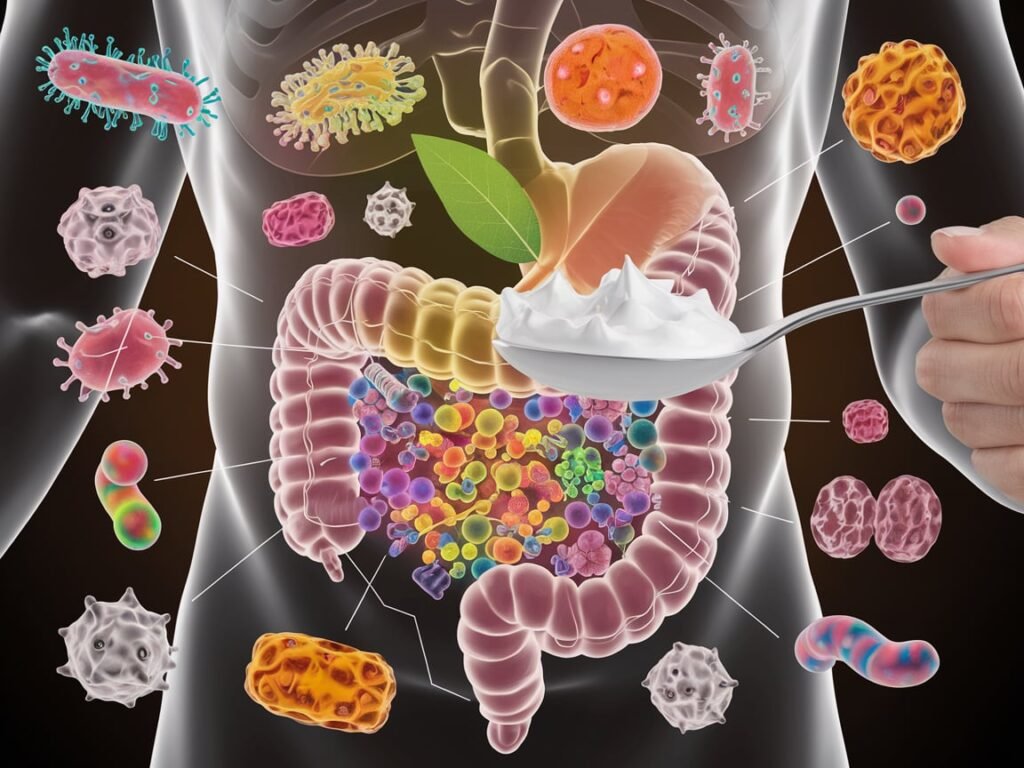Introduction
Gut health plays a pivotal role in our overall well-being, influencing not only our digestive system but also our immune system, mental health, and even our skin. The gut is home to trillions of microorganisms, including bacteria, fungi, and viruses, collectively known as the gut microbiome. Among these microorganisms, probiotics and prebiotics are essential components that significantly contribute to maintaining a healthy gut. This article will explore the definitions of probiotics and prebiotics, their functions, sources, benefits, and their overall impact on health.
Understanding Gut Health
The gut, or gastrointestinal tract, is responsible for digesting food, absorbing nutrients, and eliminating waste. A healthy gut microbiome is vital for the following reasons:
- Nutrient Absorption: A balanced gut microbiome enhances nutrient absorption from the food we consume.
- Immune Function: The gut is a significant part of the immune system, with about 70% of the immune cells residing in the gut lining.
- Mental Health: The gut-brain axis is a complex communication system between the gut and the brain, affecting mood and mental health.
- Disease Prevention: A healthy gut microbiome can reduce the risk of various diseases, including obesity, diabetes, and inflammatory bowel disease.
What are Probiotics?
Probiotics are live microorganisms that provide health benefits when consumed in adequate amounts. These beneficial bacteria help maintain a healthy balance of gut flora, which is essential for optimal digestive health.
Types of Probiotics:
- Lactobacillus: Commonly found in yogurt and fermented foods, this strain aids in lactose digestion and can alleviate diarrhea.
- Bifidobacterium: Found in dairy products and supplements, it helps boost the immune system and may reduce symptoms of irritable bowel syndrome (IBS).
- Saccharomyces boulardii: A yeast probiotic that can help treat and prevent diarrhea.
What are Prebiotics?
Prebiotics are non-digestible food components that promote the growth and activity of beneficial gut bacteria. They act as food for probiotics, enhancing their effectiveness in the gut.
Common Prebiotics:
- Inulin: Found in foods like garlic, onions, and bananas, inulin supports the growth of beneficial bacteria.
- Fructooligosaccharides (FOS): Present in asparagus, artichokes, and whole grains, FOS helps improve gut health.
- Galactooligosaccharides (GOS): Found in legumes and dairy products, GOS also supports the growth of beneficial gut bacteria.
The Importance of Probiotics and Prebiotics
- Enhancing Digestive Health: Probiotics help restore the natural balance of gut bacteria, particularly after disturbances caused by antibiotics, illness, or poor diet. Prebiotics provide the necessary nutrients to sustain this beneficial bacteria, ensuring optimal digestive function.
- Boosting Immune Function: Both probiotics and prebiotics play crucial roles in immune health. Probiotics enhance the production of antibodies and regulate immune responses, while prebiotics support the growth of beneficial bacteria that contribute to a strong immune system.
- Mental Health Benefits: The gut-brain connection is increasingly recognized, with studies showing that a healthy gut microbiome can positively influence mood and cognitive function. Probiotics may help alleviate symptoms of anxiety and depression, while prebiotics can support mental well-being by fostering a balanced gut environment.
- Reducing Inflammation: Chronic inflammation is linked to various health conditions, including heart disease and diabetes. Probiotics can help reduce inflammation markers in the body, while prebiotics support the growth of anti-inflammatory bacteria.
- Weight Management: A healthy gut microbiome is associated with better weight management. Probiotics may help regulate appetite and fat storage, while prebiotics can promote satiety and reduce cravings.
Sources of Probiotics and Prebiotics
Probiotic Sources:
- Fermented Foods: Yogurt, kefir, sauerkraut, kimchi, and kombucha are rich in probiotics.
- Supplements: Probiotic capsules and powders can provide specific strains in concentrated amounts.
Prebiotic Sources:
- Fruits and Vegetables: Bananas, onions, garlic, asparagus, and leeks are excellent sources of prebiotics.
- Whole Grains: Oats, barley, and whole wheat provide prebiotic fibers.
- Legumes: Lentils, chickpeas, and beans are rich in prebiotic content.
How to Incorporate Probiotics and Prebiotics into Your Diet
- Include Fermented Foods: Add yogurt, kefir, or kimchi to your meals to boost your probiotic intake.
- Eat a Variety of Fruits and Vegetables: Aim for a colorful plate filled with different fruits and vegetables to ensure a good supply of prebiotics.
- Choose Whole Grains: Replace refined grains with whole grains like brown rice, quinoa, and whole wheat bread.
- Consider Supplements: If dietary sources are insufficient, consider probiotic or prebiotic supplements after consulting a healthcare provider.
Potential Risks and Considerations
While probiotics and prebiotics are generally considered safe for most people, there are a few considerations to keep in mind:
- Immune Compromised Individuals: Those with weakened immune systems should consult a healthcare professional before starting probiotics, as they may be at risk for infections.
- Digestive Issues: Some individuals may experience mild digestive discomfort when first introducing probiotics or prebiotics into their diet. It’s advisable to start with small amounts and gradually increase intake.
- Quality of Products: Not all probiotic supplements are created equal. Look for products with specific strains supported by research and that contain an adequate number of live organisms.
Conclusion
Maintaining a healthy gut is essential for overall health, and incorporating probiotics and prebiotics into your diet can play a significant role in achieving this goal. By understanding the importance of gut health and making conscious dietary choices, you can enhance your digestive function, boost your immune system, and promote mental well-being. As research continues to uncover the complexities of the gut microbiome, it is clear that a balanced diet rich in probiotics and prebiotics is a cornerstone of a healthy lifestyle.

